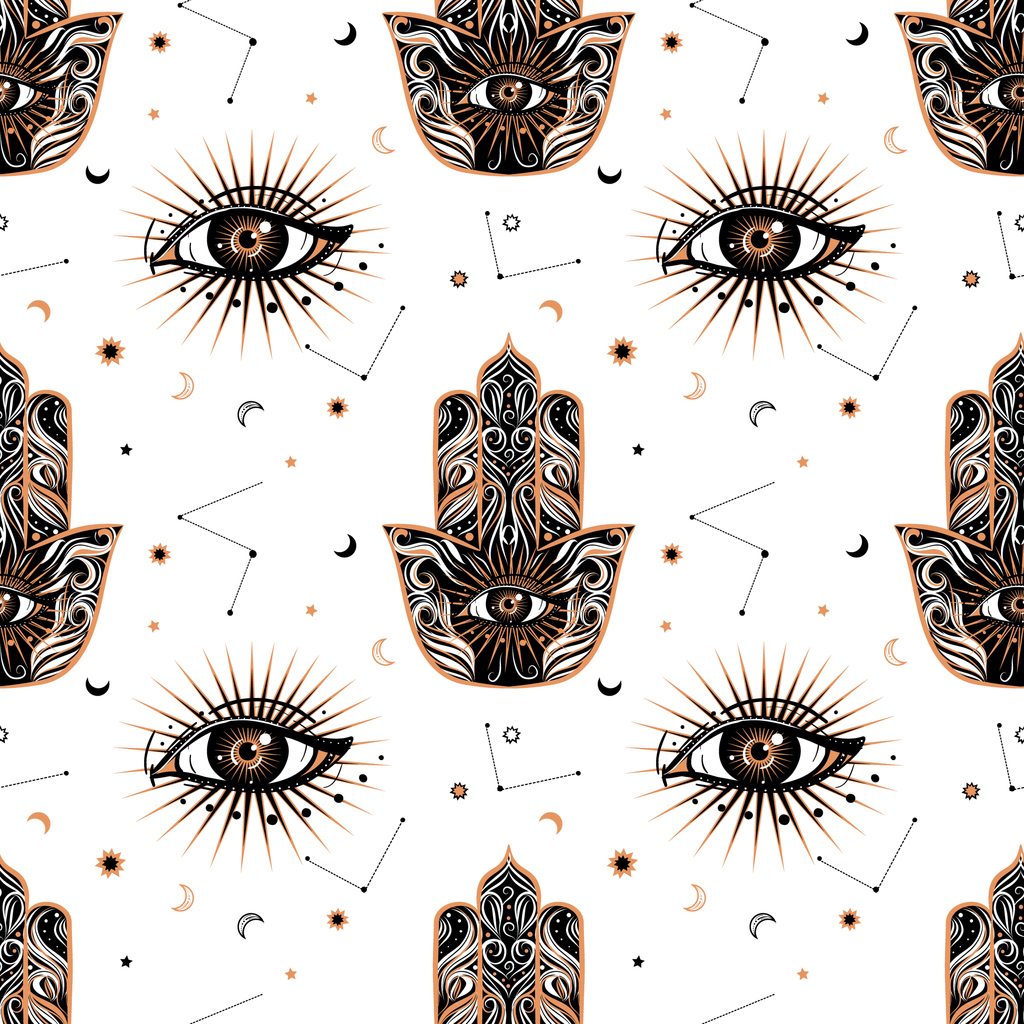Witch culture has become trendy recently, and not surprisingly. There are so many enticing components, from crafting one’s personal spirituality to embracing the sacred feminine to loving the earth. But being a witch isn’t just fashionable attire and games. There is a whole culture to witchcraft, and of course, with culture comes the question of Big Bad cultural appropriation.
Religions borrow and steal — the world is a terrible and hallowed mess of appropriation. In order to really understand and take on a way of life in an appropriate yet not appropriative way, one has to do their research. When I researched the roots of practiced magic, which women (and men) have been involved with since the beginning of humanity, I found a large part of its history is intertwined with Judaism.
Who woulda thought?
First off, let me answer the titular question of, “Can I be a Jew and a witch?” right away. Yes, obviously. You can do whatever you want to get your spiritual rocks off, do you understand me? If we really delve into it, the world’s major religions all hail from various primal pagan desires to find meaning in this crazy world. We are all still searching for that, and religious kink-shaming is unhelpful.
With that preach out of the way, let’s venture into a little history, a tad bit of philosophy, and the realities of being a Jewish witch in this day and age.
Admittedly, Biblical Judaism wasn’t entirely on board with magic. All those books about rules — Exodus, Leviticus, Numbers, and Deuteronomy — are known for having harsh views of the counterculture. It is a dark look into our patriarchal past — a matrilineal line doesn’t matter when the men are still making all the decisions, ya’ll. My personal favorite no-no is from Exodus 22:18, “A sorcerer shall not be allowed to live,” but one could also admire the subtle guilt of Deuteronomy 18:9-12, “There shall not be found amongst you … a sorcerer, soothsayer or engager of witchcraft … For it is an abomination before God, and it is on account of these abominations that God is giving you their land.” Nothing like gifting people a homeland simply because they haven’t dabbled (yet) in abomination!
Meanwhile, from a Jewish philosopher standpoint, we’ve got two perspectives from the 1100s: Maimonides and Nachmanides. Maimonides, a prominent medieval Sephardic philosopher, believed that magic was full of “emptiness and vanity” — a false prophet that led the Jewish people to idolatry. For a people that literally (allegedly) got sucked up by the earth when they got excited about a golden calf, idolatry is clearly not ideal. On the other hand, Nachmanides, a leading medieval Jewish scholar, believed that the “spiritual layer,” like everything in this world, was created by God. However, toying with magic was not necessarily divine — he believed that if God created natural laws, it was His will that humans follow these laws instead of undermining nature with the use of magic.
At the same time, in an article from the Forward, Rabbi Geoffrey Dennis claims that “virtually all of them [Rabbis of the Talmud] believed that their wives engaged” in magic. He states, “it was part and parcel of traditional life for women.” That isn’t to say that Jewish men didn’t also dabble; Dennis points out that Jewish men depended on astrology, though that wasn’t considered witchcraft because, again, patriarchal society and all that. However, it is interesting to note that while these dudes weren’t incredibly down with witchcraft, there is not a record of community Jewish witch hunts like those happening in the Catholic communities of the time.
Even more interesting than ancient Jews being ashamed of their witchcraft is modern day Jews leaning into it. I spoke a little bit with self-proclaimed “JeWitch” Susala Kay, a founder of The JeWitch Collective, a Bay Area organization that, as described by their website, draws on “earth-based magic to pursue Tikkun Olam (Repair of the World).” This organization strives to be inclusive and states, “ultimately, if you identify as a Jewitch, resonate with our community, spirituality, values, culture and/or feel an affinity with any of these, you are warmly welcome to participate.” Susala revealed that the JeWitches are inspired by Reclaiming, a movement started in 1980 to unify spirit and politics rooted in love of the Goddess. The JeWitches “draw from pagan roots of Judaism.”
The JeWitches have a busy roster for the summer months, including a Song of Songs seder celebrating queer sacred sexuality to kick off Pride month and a reading of Andrew Ramer’s book, Deathless: The Complete, Uncensored, Heartbreaking, and Amazing Autobiography of Serach bat Asher, the Oldest Woman in the World. The organization also involves itself in tikkun olam-based projects, ranging from baking hamantaschen for seniors involved in a Holocaust Survivors support group to joining a “Hex for the Future” at San Francisco’s City Hall. The collective also hosts a JeWitch camp which feels like the place for all the weird kids at Jewish camp who didn’t have anyone to make out with in the gaga pit (i.e. me).
Beyond the Bay Area, the internet is a beautiful and wondrous place where one can find all sorts of information on the intersection of Judaism and magic. My personal favorite is Peel a Pom, a personal exploration of Jewish earth-based magic. The best part involves a cheese seder plate for Shavuot with different cheeses representing each Jewish Prophetess (give me some of Esther’s Ash-coated Chèvre right now)! Peel a Pom might not be every neophyte Jew-Witch’s jam — even with the cheese seder — so I highly recommend doing some of your own research.
I would be remiss if I didn’t shout out the OG Jewish Witch, Lilith, before ending this joint. According to Janet Howe Gaines, this demon of myth was kicking it in Babylon before Jews created their own version of the story: a woman pulled from the earth alongside her partner Adam. Lilith refused to submit to her equal, and was booted out of the garden of Eden and replaced from a rib by the more docile Eve. For me, hopping back into Judaism’s pagan roots is important because of the bad reputation strong women have received since Lilith’s Day 1.
Of course, like Lilith and our witch-y ancestors before us, some may try to tell you that there is no place for paganism in Judaism. Susala of JeWitches shared with me, “As far as the haters go, we don’t engage. We are focused on love, compassion, and feel confident that positivity begets positivity.” That’s some magic with which I’m sure we could all agree.
As for me, a Jewish girl raised to be a devout Christian by her Protestant mother and then sent to Catholic schools, I grew disillusioned by the dogmatic and elitist traditions I saw around me. And yet, I understood the need for ritual and tradition in my life as a means of spiritual healing. I am still learning what my JeWitch traditions will be — I study religiously to find the ways to merge these cultures I have chosen. I light candles on Shabbat. I burn sage to heal my body. I recite the Mourner’s Kaddish in memory of my loved ones. I write each day and I think of each work as a spell — are words not magical? All of these endeavors connect me with not just my Jewish ancestors, but all the pagan women and men who have come before me.
So can I be a Jew and a witch? Yes.



